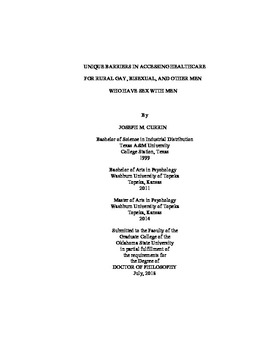| dc.contributor.advisor | Hubach, Randolph D. | |
| dc.contributor.author | Currin, Joseph M. | |
| dc.date.accessioned | 2019-03-20T18:35:41Z | |
| dc.date.available | 2019-03-20T18:35:41Z | |
| dc.date.issued | 2018-07 | |
| dc.identifier.uri | https://hdl.handle.net/11244/317603 | |
| dc.description.abstract | In 2015, the American College of Physicians called for research to understand the causes of health disparities between LGBT and their heterosexual counterparts. Little research focuses on these causes including specific barriers rural men who have sex with men (RMSM) face when attempting to access health care. A total of 209 cisgender MSM were recruited from multiple venues to complete an online questionnaire. Participants identified if they had received general medical care (GMC) or mental health care (MHC) over the past year. Andersen's (1967) behavioral health model was used to predict healthcare utilization, including an addition accounting for rural LGB experiences. A logistic regression was conducted to predict GMC and MHC, in the past year (12) and during their lifetime (L). All models were significant: for GMC-L (χ2 (7) = 72.56, p < .001), GMC-12 (χ2 (7) = 31.63, p = .003), for MHC-L, (χ2 (6) = 41.57, p < .001), and for MHC-12 (χ2 (6) = 53.26, p < .001). All models did not show a lack of fit. For the GMCL, ethnicity, education, and HIV status were significant predictors. No significant predictors were present for the GMC-12 model. Both the MHC 12 and MHC-L models had previous mental health diagnosis and disclosure of sexual orientation status as significant predictors. Due to inconsistency among the models for GMC, no pattern of barriers predicting use were found. For MHC, individuals who more openly disclosed sexual orientation status were more likely to have used mental health services. This suggests mental health providers are uniquely situated to advocate for their clients in helping access medical healthcare. Implications and limitations to the study are discussed. | |
| dc.format | application/pdf | |
| dc.language | en_US | |
| dc.rights | Copyright is held by the author who has granted the Oklahoma State University Library the non-exclusive right to share this material in its institutional repository. Contact Digital Library Services at lib-dls@okstate.edu or 405-744-9161 for the permission policy on the use, reproduction or distribution of this material. | |
| dc.title | Unique barriers in accessing healthcare for rural gay, bisexual, and other men who have sex with men | |
| dc.contributor.committeeMember | Crethar, Hugh C. | |
| dc.contributor.committeeMember | Hammer, Tonya R. | |
| dc.contributor.committeeMember | Lee, Hang-Shim | |
| dc.contributor.committeeMember | Larson, Mary Ann | |
| osu.filename | Currin_okstate_0664D_15033.pdf | |
| osu.accesstype | Open Access | |
| dc.type.genre | Dissertation | |
| dc.type.material | Text | |
| thesis.degree.discipline | Educational Psychology | |
| thesis.degree.grantor | Oklahoma State University | |
